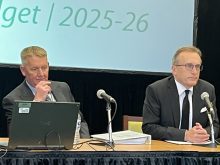The government announces record spending for health and education as well as increased operating costs for the RCMP
REGINA — Health care and education tend to dominate provincial budgets, and Saskatchewan projected record spending in both those areas for the next fiscal year.
The budget theme, Classrooms, Care and Communities, outlined the spending priorities Saskatchewan people deem important, the government said.
The health budget is a record $7.6 billion, up nearly $584 million, or 8.3 per cent, from the previous year, not including capital funding. The Saskatchewan Health Authority will receive nearly $4.7 billion to improve services across the system.
Read Also

U.S. bill could keep out Canadian truckers
The Protecting America’s Roads Act, which was tabled in the U.S. House of Representatives at the beginning of October, would “rid the country of illegal immigrant commercial truck drivers and ineligible foreign nationals.”
The Kindergarten to Grade 12 education system will receive $3.3 billion.
However, the labour dispute between the government and the province’s teachers continues, with a province-wide strike and thousands of picketing teachers outside the Legislative Building during the March 20 announcement.
Overall, the budget projects a deficit of $273.2 million on revenue of $19.9 billion and expenses of $20.1 billion.
Almost unnoticed among the larger ticket items was a small $4.3 million increase to the RCMP’s operating costs. The Saskatchewan Association of Rural Municipalities said it would like to see more directed to the police force that serves the large rural geography.
“We know there are challenges. The RCMP will receive more funding if they can retain more members and we understand that’s an issue right now,” said SARM president Ray Orb. “The number of trainees coming through F Division is increasing but we still need them to stay in Saskatchewan.”
RCMP assistant commissioner Rhonda Blackmore said the funding increase is a good start. It sits at about $228 million this year.
“The other commitment that the minister has made to us is to fund additional positions as we can provide those, which I think is a very fair commitment,” she said in an interview.
“The great thing about this now is that it helps us advocate for additional resources because we know that the funding is going to be there as positions become available.”
Blackmore said there has been a turnaround after interest in policing as a career declined due to the pandemic and incidents such as George Floyd’s death in the United States. The RCMP recruiting process was also to blame, but she said changes have been made.
“We’re seeing an increase in applicants, but we’re also seeing an increase in successful applicants, which is key,” she said.
The RCMP is looking at ways to keep recruits in their home areas if they want to stay.
“Maybe they want to live in Saskatchewan and still contribute to whether that be a family farm or return to a First Nation, they have the ability to do that now and we will commit to them that if you want to stay in Saskatchewan, you can do that.”
Blackmore said there is a delicate balance in filling the specialized teams such as Combine Traffic or warrant enforcement due to the shortage of officers, but that should change as more resources are made available.
She added that the RCMP is examining detachment boundaries to make sure regions established as much as 70 years ago are still appropriate.
Meanwhile, the proposed Saskatchewan Marshals Service got another $7 million in this budget, even though it won’t be operational until 2026.
Orb and other municipal leaders have said they need more information on exactly what the marshals will do. They say the money spent on the marshals could be better used to bolster the RCMP.
“We are still of the opinion that the RCMP should be fully funded, understanding that we need officers to have the funding in place,” Orb said, adding SARM would like the federal government to commit to having the RCMP in place as a provincial police force after the current contract expires in 2032.


















